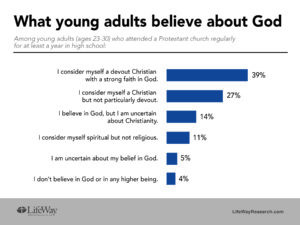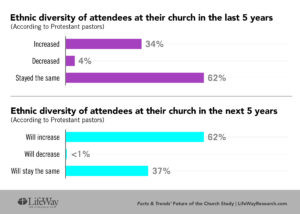Some pastors — especially among evangelicals and Pentecostals — believe worship attendance will grow as more churches embrace congregational and leadership diversity in ethnicity, gender and generation, new research has found.
LifeWay Research reported those attitudes gathered in a survey of 1,000 Protestant pastors last summer.
Among the respondents to the LifeWay survey, 40 percent said their top concern is connecting with those younger generations.
Among those surveyed, 79 percent said they expect weekly attendance to increase during the next five years – compared to 16 percent who expect attendance to remain the same. Only 5 percent anticipate declines, LifeWay reported.

Surveys conducted by the Pew Research Center and others present a picture of those younger U.S. residents as complex and diverse in their attitudes and highly suspicious of institutions.
But research conducted by other organizations suggests that ministers and congregations intent on reaching younger adults have their work cut out for them. They have found an ever-widening ideological, spiritual and economic gap between younger and older Americans, with the former being increasingly suspicious of businesses, churches and other institutions.
“The generation gap in American politics is dividing two younger age groups, Millennials and Generation X, from the two older groups, Baby Boomers and the Silent Generation,” Pew reported in a 2017 survey.
The organization has also described Millennials as disconnected from institutions, making them more likely to be political independents and religiously unaffiliated.
And churches aren’t the only ones noticing.
The global auditing and consulting firm Deloitte published its seventh annual Millennial Survey in 2018. Among its findings was a negative shift in that generation’s attitudes toward businesses.
Attracting and retaining Millennials and Gen Z, Deloitte reported, includes offering positive workplace cultures and diversity in management.
And that seems to be what is envisioned by the ministers surveyed by LifeWay Research.
“Looking toward to the future, many pastors anticipate numerical growth of their congregations, increased ethnic diversity, more leadership roles for women, and robust community engagement by church members,” the Nashville-based research group said in a summary of its report online.
Optimism about growth in worship attendance was highest among among pastors ages 45 to 54, evangelicals, Pentecostals and pastors with current worship of 250 or more. African-American pastors also were more likely to expect those increases.
However, LifeWay Research said it found a disconnect between anticipation and past performance.
While 79 percent expect overall attendance increases, only 36 percent said such growth occurred in the past five years.

And while 72 percent anticipate more 18- to 29-year-olds in their churches in the future, only 32 percent reported such growth in the past five years.
“Again, there is a huge amount of optimism there,” LifeWay Research Executive Director Scott McConnell said in the online summary. “And yet, you have to ask what needs to change to actually see that increase happen?”
Ethnic diversity of attendees also will increase, according to 82 percent of the respondents – compared to 34 percent who reported such growth occurred in the past five years.
“When LifeWay Research asked pastors about the ethnic diversity of leaders in the next five years, half of pastors (52 percent) say ethnic diversity will increase and half (48 percent) say it will stay the same. Less than 1 percent say it will decrease,” the report said.
Nearly half, at 47 percent, said they saw an increase in women in leadership during the past five years, while 42 percent said they expect an increase during the next five years.
